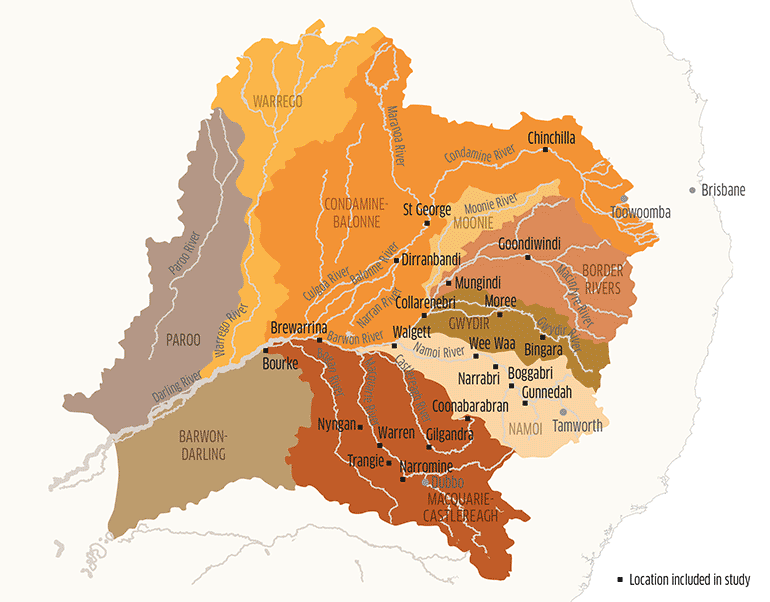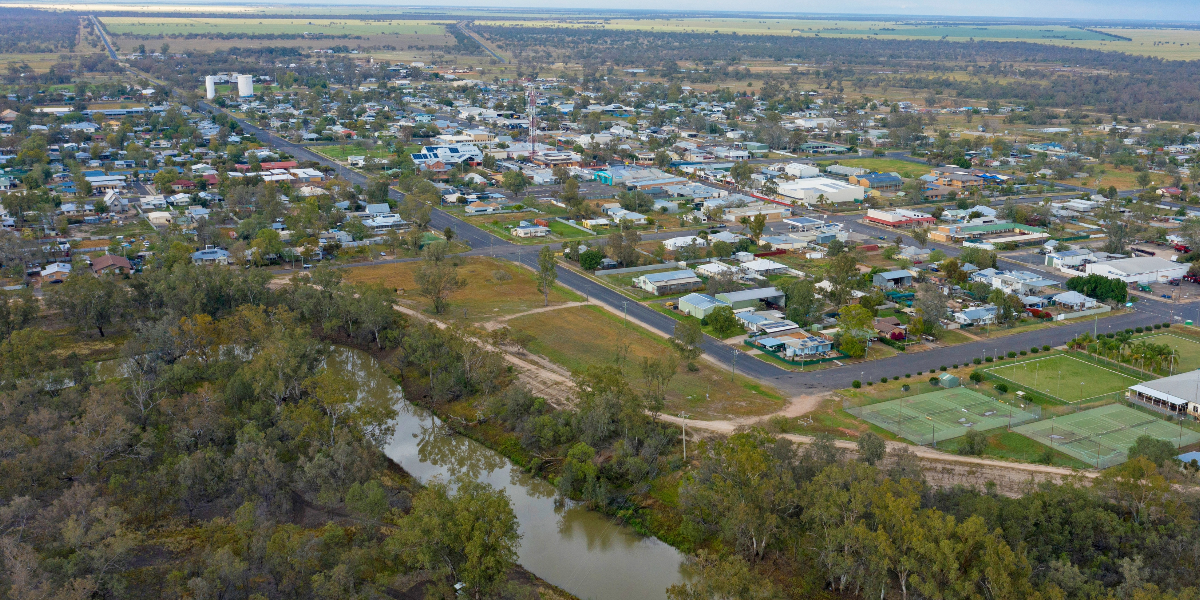In a joint statement from Tanya Plibersek and Sarah Hanson-Young yesterday, the Labor Government and Greens announced an agreement to legislate that additional water be recovered from the Northern Basin in a revamped Murray Darling Plan.
New England farmers specifically targeted
The announced deal between Labor and the Greens says they will recover an additional 450GL of water from the river by 31 December 2027, with the Northern Basin of the Murray Darling to be specifically targeted for additional water recovery. The statement says ‘any water recovered from the Northern Basin will deliver environmental outcomes that improve resilience of the Darling-Baaka to protect precious habitat and help avoid risk of devastating events like mass fish deaths’.

The Northern Basin of the Murray Darling takes in most of the New England and neighbouring regions to the north, west and south. In environmental activist circles, the term ‘northern basin’ is often used as code to refer to cotton irrigators and the ideological falsehood that they are wasteful water users, and completely ignores all other producers and towns that rely on the Murray Darling waterways.
The Bill explicitly only allows for entitlements transferred from the irrigation pool to the environment.
We have to get this right
Tanya Plibersek, Minister for the Environment and Water, says she is willing to work with all parties who are interested in getting the best outcome for the Basin.
“We know better decisions are made when the Government works collaboratively with others. I welcome the constructive engagement by Senator Hanson-Young on this matter.
“We’re talking about the largest inland river system in Australia, supporting threatened plants and animals and delivering drinking water for 3 million Australians. We have to get this right.”
“Not delivering this is simply not an option. We want to make sure we have a healthy and sustainable river system for the communities, industry, First Nations groups and environment that rely on it.”
The deal does include addition recognition of First Nation’s connection to water, and $100 million for the Aboriginal Water Entitlement Program.
“The Greens have secured $100m for First Nations water and the Aboriginal Water Entitlements Program to protect Country and culture from greed and over-extraction. For the first time, the laws governing the Murray-Darling Basin will recognise the unique connection First Nations people have with the river system,” Senator Hanson Young said.
Fake environmental benefits and real community harm
A number of groups and leaders have, unsurprisingly, come out strongly against the deal that so blatantly targets farmers in New England and surrounding areas to give to theoretical environmental benefit hundreds of kilometres (and gigalitres of evaporation) away.
NSW Irrigators’ Council CEO Claire Miller said if the deal stands, it will be another nail in the coffin for regional communities who rely on the jobs, services and income generated by an agriculture sector under siege from this Government.
“This Government could not be more out of touch when Australians across the city-country divide are saying no to water buybacks costing regional jobs, hollowing out towns and driving up food prices,” said Ms Miller.
“To add insult to injury, it is well documented that any water recovered cannot physically be delivered where it is intended to go. All this legislation does is recover numbers on a page at the expense of farmers and regional communities.”
Nationals leader David Littleproud also said yesterday reducing irrigation entitlements and increasing buyback would cripple irrigation towns, raise the price of water and increase the price of food.
Dictated by inner-city politics rather than science and reality
NSW Farmers Water Taskforce chair Richard Bootle, who also lives in a Basin community and has been on the ground at recent rallies against buybacks, said too many policy issues were being dictated by inner city politics rather than the realities on the ground.
“Politicians have failed to listen to locals who have been warning them about the detriments of water buybacks.”
“Unfortunately for Labor, this is a decision they’ll one day regret. It’s just a pity that regional communities will suffer.”
NSW Farmers have called for the NSW Government to distance themselves from the federal Albanese Government on this issue.
“Now’s the time for the Minns Government to see the writing on the wall and draw a line in the sand. They should be publicly announcing they don’t support water buybacks or they too will suffer when people’s grocery bills soar even further.”
The Australian Bureau of Agriculture and Resource Economics (ABARES) published a report in 2020 that says buybacks are the least expensive recovery mechanism in the short term but can have flow-on effects to regional economies as a result of reduced irrigated agricultural production, and drive up water prices. They found water buybacks have already driven water allocation prices above $200/ML in three out of 10 years, and estimates taking another 450 GL from farmers would push this to eight out of 10 years.
The ABARES report also found that water efficiency investment would return 1.75 times the value of buybacks. Claire Miller from the NSW Irrigators Council says that the majority of submissions to the Senate Inquiry and national polling are also against buybacks.
“Most farmers cannot afford to stay in business with water prices this high, this often.”
The NSW Irrigators Council argues the Government is pushing ahead with “damaging and divisive buybacks” without comprehensive social, economic and environmental impact research, genuine consultation or bipartisan and Basin State support.
“This is not a win for the environment as it does not deliver what the river actually needs. Fish passages, carp management, fish habitat restoration and relaxing the restraints will deliver real environmental outcomes, not unnecessary buying back more water that can’t be delivered,” Ms Miller said.
Additionally, the Northern Basin Review, conducted by the Murray–Darling Basin Authority (MDBA) between 2012 and 2016, resulted in a 70 gigalitre (GL) reduction to the 390 GL per year water recovery target in the north to 320 GL; this deal reverses that science-based decision and demands an additional 130 GL of water be taken from farming.
Worst possible outcome
National Farmers’ Federation President David Jochinke also argues that this deal throws our local communities under the bus, deliver no benefit for the environment, and will drive up the cost of food.
“This is the worst possible outcome for the Basin Plan,” Mr Jochinke said.
“This deal makes it crystal clear the Government is completely out of touch and doesn’t give a stuff about communities.
“Their lip service about what’s best for communities is completely disingenuous. They’re only interested in the politics and whatever sleazy backroom deal can keep hold of inner-city marginal seats at the expense of jobs and livelihoods in the Basin,” he said.
Of particular concern to NFF is that this deal destroys the long bipartisan support for the Murray Darling Basin Plan.
“The Plan has always been bipartisan and had the full support of Basin states. That’s now coming unravelled as the Minister attempts to bully and bulldoze senators, states and stakeholders into submission,” Mr Jochinke said.
“The Basin Plan has always included checks and balances to limit the harm to Basin towns. What the Labor-Greens Bill does is remove these limits to green light uncontrolled buybacks no matter the cost to communities.”
NSW Senator and National Party spokesperson on water Perin Davey also condemned the breakdown of bipartisanship.
“The deal with the Greens shows us who is really controlling water policy in this country, and it’s not Tanya Plibersek,” Senator Davey said.
“The Opposition was negotiating in good faith with the Government to come to a deal that struck a balance between the environment and communities.
“We have always stayed firm to the agreement reached with Labor’s Tony Burke in 2012 to have social and economic impacts tested against water recovery, and if the impact was negative, the project could not proceed.”
“Today represents an abandonment of the long-standing bipartisan commitment to the Basin Plan.”
“By removing that test, the Minister has admitted that buybacks will cause social and economic harm to basin communities, but she doesn’t care.”
“When you take water away from farming communities, we all pay the price.”
Something going on in your part of the New England people should know about? Let us know by emailing newsdesk@netimes.com.au


